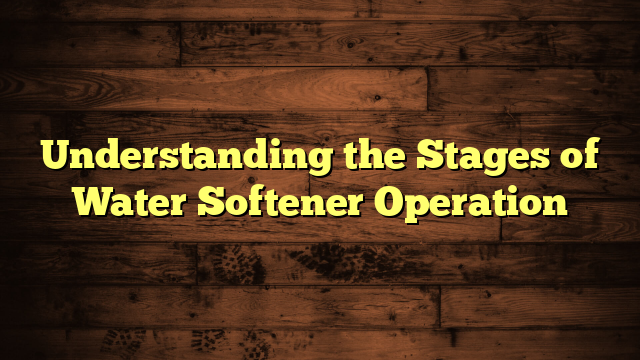Why Use a Water Softner?
You might not realize it, but hard water could be affecting your home in ways you don't expect. From soap not lathering properly to mineral buildup in your appliances, these issues can lead to increased costs and decreased efficiency. A water softener could provide a simple solution to these problems, but it's essential to understand how it works and what benefits it brings. So, what exactly does a water softener do, and how can it improve your daily life? The answers might surprise you.
Key Takeaways
- Water softeners reduce mineral buildup, preventing clogged pipes and extending the lifespan of appliances and plumbing systems.
- They enhance skin hydration and improve hair texture, reducing dryness and irritation after bathing.
- Softened water improves the effectiveness of soap and detergents, leading to lower usage and cost savings on cleaning products.
- The ion exchange process removes hard minerals, resulting in cleaner dishes and laundry without chalky residues.
- Investing in a water softener can increase your property's value and provide long-term financial benefits through reduced energy bills and maintenance costs.
Understanding Hard Water
Hard water is a common issue in many households, characterized by high levels of minerals like calcium and magnesium. You might notice some hard water characteristics if you see soap not lathering well or if you spot white, chalky residue on your faucets and dishes.
This mineral buildup can also lead to clogged pipes and reduced appliance efficiency over time. When water runs through soil and rock, it picks up these naturally occurring minerals, making it "hard." Depending on where you live, the hardness of your water can vary significantly.
You may even experience different effects in various areas of your home, such as the bathroom versus the kitchen. Hard water can also affect your skin and hair, leaving them feeling dry and brittle.
If you've ever noticed that your laundry feels stiff or looks dull, it could be due to the interaction between your detergent and hard water. Understanding these characteristics can help you identify whether you're dealing with hard water and its potential impacts on your daily life.
Awareness is the first step toward finding a solution to the challenges it presents.
Benefits of Water Softeners
Using a water softener can significantly improve the lifespan of your appliances, saving you money on repairs and replacements.
Not only that, but you'll also notice a difference in your skin and hair, as softer water helps reduce dryness and irritation.
Improved Appliance Lifespan
Water softeners can significantly extend your appliances' lifespan, saving you money and hassle in the long run. Hard water contains minerals like calcium and magnesium that can build up in your appliances, leading to clogs, breakdowns, and reduced performance. By using a water softener, you're effectively removing these minerals, which enhances appliance efficiency.
When you soften your water, you'll notice that your washing machine, dishwasher, and water heater all operate more smoothly. This means they won't have to work as hard to perform their tasks, leading to less wear and tear over time.
You'll also benefit from fewer repairs and replacements, which can be costly and inconvenient.
Moreover, the longevity benefits of using a water softener extend beyond just major appliances. Smaller devices, like coffee makers and humidifiers, also thrive in softened water, ensuring you get the best performance from all your household gadgets.
In essence, investing in a water softener not only improves your appliances' efficiency but also contributes to their longevity, making it a smart choice for any homeowner looking to save money and enjoy hassle-free living.
Enhanced Skin and Hair
Many people experience improvements in their skin and hair after switching to softened water. The minerals present in hard water can strip away natural oils, leading to dryness and irritation. With softened water, you'll notice enhanced skin hydration, leaving your skin feeling smoother and more supple. Your hair texture can also benefit significantly; it'll feel softer and more manageable, reducing frizz and breakage.
Here's a quick comparison to illustrate the benefits:
| Aspect | Hard Water | Softened Water |
|---|---|---|
| Skin Hydration | Dry, irritated | Hydrated, smooth |
| Hair Texture | Frizzy, coarse | Silky, manageable |
| Product Efficiency | More soap needed | Less soap needed |
Switching to a water softener not only improves your daily routines but also enhances your overall well-being. You'll find that your skin feels fresher, and your hair looks healthier. With these improvements, you can embrace your natural beauty and feel confident every day. So, consider making the switch and enjoy the benefits of enhanced skin and hair!
How Water Softeners Work
To understand how water softeners work, you need to look at the ion exchange process at the heart of their function.
This method not only reduces hardness in water but also brings a range of benefits that can enhance your daily life.
Plus, knowing some installation and maintenance tips will help you keep your system running smoothly.
Ion Exchange Process
A water softener operates primarily through a process called ion exchange, which effectively removes hard minerals like calcium and magnesium from your household water supply.
This process involves resin beads that are charged with sodium ions. When hard water flows through the softener, the calcium and magnesium ions in the water are attracted to these resin beads and replace the sodium ions.
Here's how the ion exchange process works:
- Hard minerals bind to resin beads: As water passes through the softener, the hard minerals attach to the resin, freeing up sodium ions.
- Regeneration phase: Once the resin beads become saturated with hard minerals, the softener enters a regeneration phase, where a salt solution flushes out the accumulated hardness and replenishes the sodium ions.
- Continuous cycle: This cycle of ion exchange and regeneration allows for a consistent supply of softened water for your home.
Benefits of Softened Water
Softened water offers numerous advantages that can enhance your daily life. One of the most noticeable benefits is how it affects your home. By using softened water, you can enjoy cleaner dishes, as it prevents mineral buildup that typically leaves spots and film on your glassware.
| Benefit | Description | Impact |
|---|---|---|
| Cleaner Dishes | Reduces mineral buildup on dishes and glassware | Less time spent scrubbing |
| Softer Skin | Eliminates harsh minerals, leaving skin smooth | Improved skin hydration |
| Brighter Clothes | Prevents dinginess in laundry | Clothes look newer longer |
| Lower Soap Usage | Softened water lathers better, using less soap | Saves money on cleaning products |
| Improved Appliance Lifespan | Reduces scale buildup in appliances | Fewer repairs and replacements |
Every time you wash your clothes, dishes, or even take a shower, softened water helps you achieve better results. You'll notice that your appliances run more efficiently, prolonging their lifespan and saving you money. Plus, your skin and hair will feel softer and cleaner. Embracing softened water can truly transform your household experience.
Installation and Maintenance Tips
Installing and maintaining a water softener is essential for maximizing its benefits in your home. Proper installation techniques ensure that your system operates efficiently from the start.
Begin by selecting a suitable location near your main water supply and drainage. Make sure to follow the manufacturer's instructions closely, as each model may have specific requirements.
Once your water softener is installed, establishing regular maintenance schedules is crucial. This not only prolongs the life of your system but also ensures optimal performance.
Here are some key maintenance tips:
- Check salt levels regularly: Keep an eye on the salt level in the brine tank; refill as needed to avoid running out.
- Clean the resin tank: Periodically clean the resin tank to remove any build-up that could hinder performance.
- Inspect for leaks: Regularly check connections and hoses for leaks, as even small leaks can lead to significant issues over time.
Signs You Need a Softener
Hard water can wreak havoc on your home and daily life, so recognizing the signs that you need a water softener is crucial. One of the most common hard water indicators is the presence of limescale buildup on faucets and fixtures. If you notice this chalky residue, it's a strong signal that minerals are accumulating in your water supply.
Another clear sign is when your laundry comes out looking dull and feeling rough. Hard water can leave clothes feeling stiff and may even cause colors to fade prematurely. Additionally, if you find yourself using more soap or detergent than usual to create suds, you might be dealing with hard water, highlighting the softener necessity.
You should also pay attention to dry skin and hair after bathing. Hard water can strip moisture, leading to irritation and dryness.
Lastly, if you notice your water heater or appliances are experiencing frequent issues, this might be due to mineral buildup from hard water. Identifying these signs can help you determine whether investing in a water softener is the right choice for your home.
Choosing the Right System
Selecting the right water softener can significantly enhance your home's water quality and overall comfort. To make the best choice, you'll want to consider various system types and your budget considerations.
Each type of water softener has its pros and cons, so it's crucial to find one that fits your needs.
Here are some key factors to keep in mind:
- System Types: Think about whether you prefer a salt-based system, which is effective for hard water, or a salt-free system that's more eco-friendly.
- Household Size: Consider how much water your household uses daily to determine the right capacity.
- Installation Requirements: Some systems require professional installation, while others can be easily set up by yourself.
Maintenance and Care Tips
Once you've chosen the right water softener for your home, keeping it in good shape is key to ensuring long-lasting performance. Regular maintenance helps you avoid problems down the line and keeps your system running efficiently.
Start by performing routine water testing every three to six months. This will help you monitor the hardness levels in your water and ensure your softener is working effectively.
Don't forget about filter replacement! Check your unit's manual for guidelines on when to change the filters, as this can vary by model. Typically, replacing filters annually is a good rule of thumb.
Additionally, you should periodically check the brine tank for salt levels and replenish as needed. If you notice any unusual noises or a decrease in softening performance, it might be time to consult a professional.
Finally, keep the area around your softener clean and free of debris. This not only helps with airflow but also prevents potential damage.
Cost Savings Over Time
Investing in a water softener can lead to significant cost savings over time. Hard water can wreak havoc on your plumbing and appliances, leading to costly repairs and replacements. By softening your water, you can extend the lifespan of these systems and enjoy long term savings.
Here are some financial benefits you'll notice:
- Lower energy bills: Softened water heats more efficiently, which means your water heater won't have to work as hard.
- Reduced detergent usage: With soft water, you'll need less soap and detergent for laundry and dishes, saving you money on cleaning supplies.
- Fewer plumbing repairs: Soft water minimizes scale buildup in pipes, reducing the likelihood of clogs and costly repairs.
Ultimately, the initial investment in a water softener pays off as you enjoy these ongoing savings.
You'll not only protect your home and appliances, but you'll also see a noticeable decrease in your monthly expenses. When you weigh the upfront cost against these long term savings, it becomes clear that a water softener is a smart financial decision.
Frequently Asked Questions
Can Water Softeners Remove Bacteria and Viruses From Water?
Water softeners don't remove bacteria and viruses from water. If you're worried about water quality and health concerns, consider using additional filtration methods to ensure your water is safe and free from harmful pathogens.
Are There Environmental Impacts of Using a Water Softener?
Yes, using a water softener can have environmental impacts. The sodium discharge may affect soil and water quality, and you'll need to check local environmental regulations to ensure compliance and minimize negative effects.
How Long Do Water Softeners Typically Last?
Water softeners typically last around 10 to 15 years, depending on maintenance frequency. By keeping up with regular upkeep, you can maximize your system's lifetime expectancy and ensure optimal performance throughout its years of service.
Do Water Softeners Affect Water Taste or Odor?
Water softeners can improve your water's taste by reducing mineral buildup, which often leads to unpleasant flavors. They also aid in odor removal, making your drinking experience more enjoyable and refreshing without the harshness of hard water.
Can I Install a Water Softener Myself?
Yes, you can install a water softener yourself. With proper tools and some DIY installation skills, you'll enjoy the benefits overview, like reduced scale buildup and improved appliance efficiency, all while saving money.
Conclusion
In summary, using a water softener can significantly enhance your home's water quality. By removing hard minerals, you'll enjoy cleaner dishes, softer skin, and longer-lasting appliances. If you notice signs of hard water, investing in a softener is a smart move. With proper maintenance, you'll not only reap the benefits but also save money over time. So, make the switch to softened water and experience the difference for yourself!







